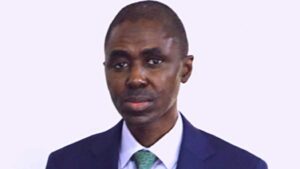


One year under Tinubu: Growth ahead as gross premium income exceeds N1trn
…Microinsurance products receive boost
By Esther Agbo
As Nigeria navigates through the first year of Tinubu’s administration, various sectors have experienced shifts and transformations.
Among them, the insurance industry stands as a critical yet often overlooked sector that plays a vital role in the nation’s economic, resilience and growth. Delving into the intricate details of how the insurance industry has fared under Tinubu’s regime reveals a tapestry of progress, challenges, and opportunities that shape the future of financial security in Nigeria.
One year into Bola Tinubu’s presidency, Nigeria’s insurance industry finds itself at a pivotal juncture. As a sector that historically lagged behind in terms of penetration and public confidence, the past year has seen a mixture of achievements and ongoing challenges.
Ratings agency Agusto & Co. reported that Nigeria’s insurance industry had a strong fiscal year in 2023, with gross premium income (GPI) exceeding N1 trillion.
Despite challenges from elections and policy reforms, the industry maintained significant growth. The 2024 Insurance Industry Report, titled ‘The Nigerian Insurance Industry- Navigating the Turbulent Terrain,’ highlighted that elevated investment income, driven by foreign exchange gains and rising interest rates, is expected to boost growth in FY 2024.
The report noted that insurance penetration remains low at 0.4 percent, but regulatory support and premium rate adjustments have driven industry growth. Increased third-party insurance rates and higher comprehensive coverage requirements contributed significantly to the GPI rise. Depreciation of the naira also boosted premiums from foreign currency policies, particularly in the oil and gas sector.
Claims payouts rose in 2023 due to higher replacement costs and policyholder claims. However, the industry’s performance is expected to improve with increased GPI moderating claim growth. Investment income saw significant gains in 2023 due to higher interest rates and foreign exchange gains from Eurobonds and USD mutual funds, leading to an estimated 12.2 percent return on investment compared to 7.3 percent in 2022.
In 2024, Agusto & Co. anticipates higher investment income due to the Central Bank of Nigeria’s 400 basis points monetary policy rate hike depicting a surge in interest rates, particularly on government securities and placements which dominate the industry’s investment portfolio and a bullish equities market.
The industry is expected to benefit from improved underwriting performance and regulatory support, with NAICOM continuing to implement policies for industry viability. The shift to a risk-based capital regime is also expected to progress despite previous delays.
The equities market has also garnered the attention of many investors after the NGX’s all-share index posted a 45.9 percent return in 2023 and went on a bullish run in the first two months of 2024.
Insurance penetration
Since President Tinubu assumed office, insurance penetration in Nigeria has continued to struggle with longstanding issues, showing little significant improvement. Insurance penetration, which refers to the ratio of total insurance premiums to the gross domestic product (GDP), has remained low, consistently hovering around 0.5 percent to 1 percent. This is well below the global average of 6 percent and even lower than the African average of 3 percent.
Despite various initiatives and regulatory changes aimed at boosting the sector, the performance has been lacklustre. The Tinubu administration has attempted to revitalise the economy and, by extension, the insurance sector, but these efforts have not yet translated into substantial growth in insurance uptake among Nigerians.
Current estimates suggest that less than 1 percent of Nigerians have any form of life insurance, despite government policies aimed at boosting coverage. However, the past few years have seen some progress, as gross premiums have gone from N326 billion in 2016 to N726.4 billion in 2022, with life insurance seeing the most growth. This low percentage highlights the vast untapped potential within the Nigerian insurance market. Factors contributing to this include a lack of awareness, cultural beliefs, and economic constraints that limit individuals’ and businesses’ ability to invest in insurance products.
Talking about Automotive Insurance, data sourced from the Federal Roads Safety Corps (FRSC) and the Nigerian Insurers Association (NIA) revealed that there are 12 million vehicles plying roads across the country of which only 3.11million were insured as at the end of 2023, indicating only 25 percent of vehicles are currently insured.
The population of insured vehicles dipped from 3.70 million in 2022 to 3.11million in 2023, showing that, about 600,000 vehicles failed to renew their insurances when their previous coverage expired, owing to tough operating business atmosphere and increasing cost of living that has made Nigerians relegate insurance in their scale of preference.
This figure, while indicating a higher uptake compared to other insurance sectors, still reflects significant room for growth. Mandatory third-party motor insurance laws have spurred some compliance, but enforcement remains a challenge, leading to widespread underinsurance and uninsured vehicles on the roads.
Health insurance, a critical component for safeguarding citizens’ well-being, has seen gradual improvements. Since the beginning of President Bola Tinubu’s administration, the percentage of Nigerians covered by health insurance has remained low. Recent data indicates that only about 8-9 percent of Nigerians are currently covered by health insurance, leaving over 90 percent without coverage.
This highlights a significant gap in healthcare accessibility and affordability for the majority of the population.
The government has initiated efforts to expand health insurance coverage. For example, around 750,000 additional Nigerians have been enrolled in health insurance schemes since the start of Tinubu’s administration. Despite these efforts, the overall coverage remains insufficient, underscoring the need for more robust and inclusive health insurance policies to achieve universal health coverage.
Government schemes such as the National Health Insurance Scheme (NHIS) have made strides in expanding access, but challenges such as limited reach in rural areas and the informal sector’s dominance impede broader coverage. Efforts to enhance public-private partnerships and introduce innovative health financing models are crucial for achieving more inclusive health insurance penetration.
Global standing: Nigeria’s place in the insurance world
On the global stage, Nigeria’s insurance industry ranks low, reflecting its nascent state and the challenges it faces. Among African nations, Nigeria is positioned behind South Africa, Kenya, and Morocco, which boast more mature and robust insurance markets. The need for regulatory reforms, technological advancements, and enhanced consumer trust is paramount for Nigeria to elevate its standing and competitiveness in the global insurance arena.
The role of the Insurance Commission (NAICOM)
The National Insurance Commission (NAICOM) was established in 1997 by the National Insurance Commission Act 1997 with responsibility for ensuring the effective administration, supervision, regulation and control of insurance business in Nigeria and protection of insurance policyholders, beneficiaries and third parties to insurance contracts.
However, stating their primary role through their X (formerly Twitter) handle as to effectively administer, supervise, regulate and control the Nigerian Insurance Industry in order to protect insurance consumers and support financial stability, Insurers aren’t taking it likely as most complain about the non performance of the commission.
Some complain of insurance companies withholding their claim, while others murmur about how insurance companies have been defaulting in pension payments for their annuities since February, 2023.
NAICOM has been urged to intervene and provide solutions to these challenges.
Root causes of low penetration
Several factors contribute to the low insurance penetration in Nigeria. A key issue is the lack of awareness, as many Nigerians are not informed about the benefits and importance of insurance, resulting in disinterest and neglect in considering insurance products.
Economic constraints also play a significant role. High poverty rates and economic instability reduce disposable income for individuals and businesses, making insurance a lower priority.
Cultural beliefs further contribute to low penetration, with many Nigerians preferring traditional risk-sharing mechanisms within their communities over insurance.
A trust deficit exists due to a history of fraud and mismanagement in the insurance industry, which has eroded public confidence and discouraged potential policyholders.
Finally, regulatory challenges, including inefficiencies and lack of stringent enforcement, hinder the industry’s growth and development.
Achievements
One of the notable achievements under President Tinubu has been the push for regulatory reforms and digital transformation within the insurance sector. The National Insurance Commission (NAICOM) has introduced several measures aimed at enhancing transparency and efficiency. These reforms include the digitisation of regulatory processes, which has streamlined operations and reduced bureaucratic bottlenecks.
The adoption of digital technologies has also facilitated better customer engagement and service delivery. Insurers have increasingly embraced online platforms for policy issuance, premium collection, and claims processing, making insurance more accessible to a tech-savvy younger population.
Efforts to increase insurance penetration, which historically hovered around a mere 0.5 percent of GDP, have shown some promise. Government initiatives aimed at raising awareness about the importance of insurance have started to bear fruit. Public campaigns and collaborations with financial inclusion programs have begun to demystify insurance for the average Nigerian.
Additionally, microinsurance products tailored to low-income earners and the informal sector have gained traction. These products, which offer affordable premiums and simplified coverage options, are designed to cater to the needs of a larger segment of the population, thus expanding the insurance market.
Foreign investment and partnerships
The Tinubu administration has also been proactive in attracting foreign investment into the insurance sector. Strategic partnerships with international insurance firms and investors have brought in much-needed capital and expertise. These collaborations have not only enhanced the financial stability of local insurers but have also introduced global best practices, raising the standards of the industry.
Challenges and weaknesses
The insurance market in Nigeria is highly concentrated, with a few large players dominating the sector. This limits competition and innovation, making it harder for smaller companies to thrive and offer more diverse and attractive products.
Despite these achievements, the industry continues to grapple with low consumer trust and the general lack of awareness and understanding of insurance products among the populace. Historical instances of claim denials, delays in settlements, and perceived lack of transparency have left many Nigerians sceptical of insurance companies. Building trust remains a significant challenge, as insurers must consistently demonstrate reliability and integrity in their dealings with clients.
Though regulatory reforms have made progress, they still face issues of enforcement and compliance. There are gaps in the implementation of compulsory insurance policies, and the sector suffers from inadequate regulatory oversight and inefficiencies.
Some industry players have expressed concerns over regulatory overreach and the pace of reforms. Smaller insurance firms, in particular, struggle to keep up with the regulatory demands, which can be costly and time-consuming.
Operational challenges, such as inadequate infrastructure and a shortage of skilled professionals, further hamper the industry’s growth. Insurers often face difficulties in reaching rural and underserved areas due to poor road networks and limited digital connectivity.
Nigeria’s broader economic environment has also posed challenges for the insurance sector. Inflation, currency volatility, and economic uncertainties have affected the disposable income of many Nigerians, making it difficult for them to afford insurance premiums. The economic downturn has also impacted the investment portfolios of insurance companies, affecting their financial performance and stability.
While there has been some progress in introducing new products, the pace of innovation remains slow. Many insurance products are still seen as too rigid and not tailored to the unique needs of different customer segments. There is a growing demand for more customised and flexible insurance solutions that can adapt to the changing lifestyles and risk profiles of Nigerians.
However, the traditional distribution channels for these insurance products are also limited, and there is a slow adoption of digital channels that could potentially increase reach. Many Nigerians, especially those in rural areas, do not have access to insurance services.
The way forward
While the Tinubu regime has faced significant challenges in improving insurance penetration in Nigeria, addressing these issues through strategic policies, regulatory reforms, and innovative solutions can pave the way for a more robust insurance sector.
There is a need for comprehensive awareness campaigns to educate the public on the importance and benefits of insurance. Collaborations between the government, regulatory bodies, and insurance companies can help in disseminating information effectively.
The government should also focus on policies that stabilise the economy, reduce inflation, and increase the disposable income of citizens. A stable economic environment would make it easier for individuals and businesses to invest in insurance.
Improving and strengthening regulatory frameworks and ensuring strict compliance can help build trust in the insurance sector. The National Insurance Commission (NAICOM) should enhance its monitoring and enforcement capabilities to ensure better adherence to insurance policies.
Moreover, Insurance companies need to innovate and develop products that are simple, affordable, and relevant to the needs of Nigerians. Microinsurance and tailored products for specific sectors like agriculture can help increase penetration.
Embracing digital transformation is also very important. Expanding digital distribution channels and leveraging technology can make insurance more accessible and convenient, especially for the underserved rural population.
Lastly, collaborations between the government and private sector can lead to the development of initiatives that promote insurance penetration. For example, integrating insurance with other financial services or government programs can increase uptake.



